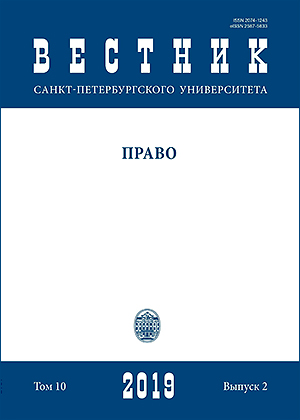Openness of public authority: issues of the conceptual and categorical framework
DOI:
https://doi.org/10.21638/spbu14.2019.203Abstract
The article analyzes provisions of the domestic doctrine on the understanding and correlation of the category of “openness” with related categories, such as “accessibility,” “publicity, “glasnost,” and “transparency.” Under conditions of the continuous development of information and telecommunication technologies, opportunities for public participation incontrolling public authorities’ activities are significantly expanding. The forms and methods of such participation are diverse and differently termed. In this connection, the unification of the conceptual-categorical framework is of particular importance, since the absence of a single scientifically grounded approach to understanding openness of public authorities hinders effective legal regulation of public relations in this sphere. The authors conclude that representatives of legal science consider “openness” the conception most widespread and broadest in scope that correlates with other categories close in subject and content, depending on functions performed by the public authorities. It also structurally combines “information openness” and the citizen involvement in the activities of government bodies. In turn, “accessibility” is understood as the possibility of unimpeded access to information about authorities’ activities. “Glasnost” and “publicity” are expressed for the receipt and dissemination of information about activities of judicial and representative of the authorities. “Transparency,” in its narrow sense, equals accessibility to information about activities of the authorities, while “transparency” in its broad sense is the equivalent of openness, which has become widespread in other socio-political sciences.
Keywords:
public authority, openness, accessibility, glasnost, publicity, transparency
Downloads
References
Downloads
Published
How to Cite
Issue
Section
License
Articles of "Vestnik of Saint Petersburg University. Law" are open access distributed under the terms of the License Agreement with Saint Petersburg State University, which permits to the authors unrestricted distribution and self-archiving free of charge.






